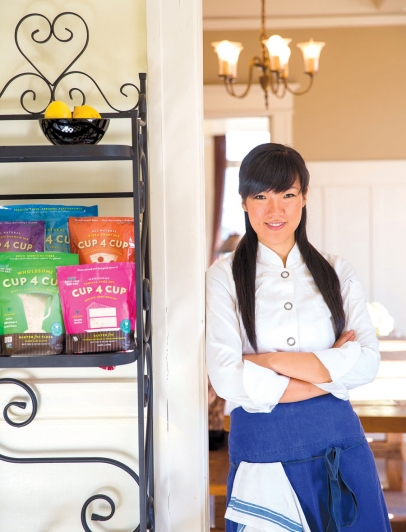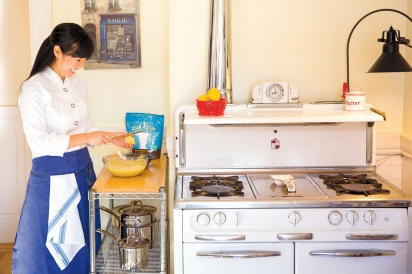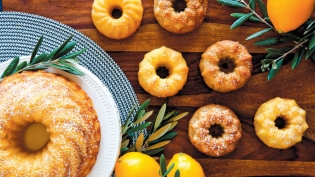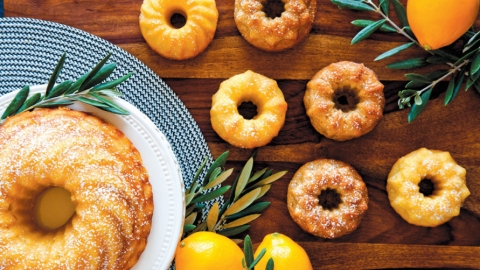Kwak and Keller’s Cup4Cup: Gluten-Free Flour Good Enough for Everyone
The science-minded Lena Kwak thought she might go to medical school, which would have thrilled her parents. Instead, the then-18-year-old Korean-American opted for a four-year culinary degree at Johnson & Wales in Rhode Island, where she majored in nutritional science.
From that experience she learned that she wasn’t particularly interested in working the line in a professional kitchen. Instead, the avid cook toyed with the idea of becoming a recipe developer for a food magazine. But then an internship at The French Laundry in Yountville was dangled her way during her senior year. She jumped at the chance to work with famed chef Thomas Keller. What culinary professional wouldn’t want to learn from the crack team at the Michelin three-star restaurant? She was just 20.
The Hong Kong–born, New York–raised Kwak loved the experience so much she wanted to stick around. So she conceived of an entirely new position in Keller’s kitchen—that of research and development chef—and she pitched herself as just the girl for the gig.
Keller bit. The idea wasn’t that wild: The chefs in the world-renowned Yountville kitchen are a creative and ambitious crew, but they’re often stymied for time to test culinary hypotheses, given the daily demands of cooking for a steady stream of diners. Kwak seemed well suited for the job of gastronomical lab assistant; in particular, French Laundry chefs were eager to devise dishes for their special-needs guests, including those who must or choose to eat sugar-free or gluten-free.
Tasked with testing such edible inventions, Kwak took her time figuring out just the right formula for whatever culinary creation she was working on. Take her all-purpose gluten-free flour. It was a challenge. It wasn’t enough just to remove the offending allergen. A GF flour needed to be formulated from scratch, so it has the characteristics of regular flour, sans the problematic protein that makes people with celiac disease or the gluten intolerant ill.
And, of course, it needed to pass a kitchen gold standard for taste, texture and performance.
“There were obstacles, but it made me work harder to create a better flour. The standard had to be so high, it was being judged by the best professional culinarians with refined palates who would pick at the taste and texture,” she says. “I’d get: ‘This is good for gluten-free.’ I hated that term. I just wanted it to be good. Period.”
First, she was assigned to develop a gluten-free version of Keller’s signature Salmon Cornet, a savory rendition of a tuile (a thin French wafer), which is served with a sweet red onion confit, crème fraîche and smoked salmon. Next: A gluten-free version of the restaurant’s lauded gougère (a choux pastry with gruyere known colloquially as a French cheese puff). Then came a request for a gluten-free brioche. Kwak nailed it every time.
How did she know? Feedback from the front-of-house staff. Then one night a guest called her out of the kitchen to discuss the brioche. Kwak tentatively approached the table. The diner, a woman who hadn’t been able to eat bread for seven years, cried joyfully as she thanked the young chef. That’s when it struck Kwak: Maybe she was on to something. Clearly, there was a growing demand for GF bread and pasta at the restaurant and in the broader retail world.
“Food evokes such a strong emotion and bread is such a fundamental food,” says Kwak, now 29, who spent seven years living in Napa before recently relocating to San Francisco. “Something so simple, like bread, that we take for granted. When that’s taken away from you, you recognize how important it was to you.”
THE BIRTH OF A BRAND
She decided to approach her boss with a big idea. “I’d been working with Thomas for two years, I’d never really sat down with him. I was so nervous my heart was racing,” she says. “I had this whole document prepared to pitch this idea and I was spitting out all this data. And then I went into the story about the woman who cried and he stopped me and said: ‘That resonates with me. What can I do to help you?’ It was amazing to have Chef Keller say: ‘What can I do for you?’”
And that’s how the brand Cup4Cup was born. The GF flour line, a joint venture between Kwak and Keller, represented the acclaimed chef ’s first product collaboration with an employee. Kwak has nothing but praise for her boss and business partner.
“He couldn’t have been more supportive. I would say ‘I don’t know what I’m doing.’ And he would answer ‘I believe in you, you can do this.’ It was like this encouraging hand guiding me down a dark hall.” Kwak was just 24 at the time she partnered with Keller; she spent 18 months fine-tuning the product, which launched in 2011.
“Every day in our kitchens, we ask ourselves, ‘How can I do it better?’ And we celebrate that moment when we find the solution because although one person may have the idea, it is often their colleagues who have the skill set or knowledge or tools to initiate it,” says Keller. “From the moment Lena Kwak entered our pastry program, she understood this. Always striving to make things better than they were the day before, Lena has been on both sides of these ideas, producing them and bringing them to fruition. This is how Cup4Cup came to be.”
The Cup4Cup original line includes a multi-purpose gluten-free flour, pancake & waffle mix, pizza crust mix and a dairy-free brownie mix.
“First, I wanted to do an all-purpose-use flour,” Kwak explains. “I wanted to give people a tool they could use in nostalgic recipes like cookies and cakes.”
That flour’s ingredients include cornstarch, white rice flour, brown rice flour, milk powder, tapioca flour, potato starch and xanthan gum, a plant-based thickening and stabilizing agent that helps give dough elasticity and viscosity. In baking, gluten is what makes dough “doughy.” Xanthan gum helps replicate this role.
Cup4Cup flour works best for quick breads, cakes and pastries. It’s even possible to make Keller’s legendary Buttermilk Fried Chicken, a menu favorite at his Ad Hoc Yountville restaurant, with the all-purpose flour. In fact, Kwak maintains the GF flour gives the dish a crispier coating than gluten flour.
This writer took the pancake and brownie mixes for a test drive and can report back that her discerning in-house taste tester, a ravenous teen, gave both the thumbs up. The brownies came out fudgy and moist, the pancakes light and airy—surprising, given the thickness of the batter.
In 2014 the brand launched Wholesome Cup4Cup Flour, responding to customer requests for a more healthful GF option. The non-GMO flour, which includes brown and white rice flours, ground flax seed, rice bran and xanthan gum, contains fiber, omega-3s and antioxidants. This year the company will debut its Wholesome Yellow Cake Mix and Wholesome Cornbread Mix.
PRODUCT RESONATES WITH PRO CHEFS AND HOME COOKS TOO
Despite its hefty retail tag of $16 for three pounds, Cup4Cup’s all-purpose flour has become a go-to GF flour for discerning professional chefs, says Kwak, because it delivers on its promise of performing as regular flour does. It’s now the flour of choice for the gluten-free pastas earning rave reviews at Mark Ladner’s Del Posto in New York. It can also be found in the GF lavash at Benu, the lauded San Francisco restaurant run by chef Cory Lee, who mentored Kwak while he was the head chef at The French Laundry.
GF guests are grateful. “Since being diagnosed with celiac disease nearly seven years ago, I’ve come to really appreciate restaurants that are willing to take extra care to make sure all eaters are graciously cared for,” says Erin Scott, the author of a recent cookbook and popular food blog both titled Yummy Supper. “Cup4Cup has played a delicious role in two of my most spectacular dining experiences as a gluten-free eater: The French Laundry spoiled me with buttery dinner rolls and I still dream of the homemade GF pasta at Flour + Water in San Francisco—both made with Cup4Cup.”
Cup4Cup launched its consumer business in partnership with Williams- Sonoma. The line is available at gourmet and specialty markets including Bay Area Whole Foods Markets, the Mill Valley Market and Oliver’s Markets in Sonoma County.
The brand name is a nod to both a common cooking measurement and Kwak’s desire to replace all-purpose wheat flour in most recipes, literally cup for cup. The product has done well from the beginning. “We pushed ourselves not to create the best gluten-free flour but to create a flour that rivals regular wheat flour,” she says.
Kwak won’t disclose exactly where the product is manufactured in the Bay Area, and she is reluctant to share hard sales numbers. What she’s comfortable conveying: Business has doubled every year since the product launched and it was an out-of-the-gate success.
Kwak’s been garnering attention in culinary and media circles ever since. She was named one of Forbes’ “30 Under 30” in 2011 and nabbed a Zagat “30 Under 30” nod in 2012. She scored a Martha Stewart “American Made” Award the same year. In 2014, Fortune and Food & Wine dubbed her one of the top 25 most innovative women in food. GFF (Gluten Free Forever), a national glossy based in San Francisco that launched last year, featured a dramatic image of Kwak smeared in flour (gluten free, one presumes) as its badass cover girl. Not too shabby for an emerging edible entrepreneur.
More of a savory cook, Kwak does bake for parties or potlucks for family and friends. Her crowd-pleasing specialties include a chocolate lava cake made with Cup4Cup Brownie Mix and coconut oil that she serves with a scoop of salted caramel ice cream. She’s also fond of beet cake with whipped goat cheese frosting and candied pistachios, which uses the Wholesome Cup4Cup flour. For an Easter or spring event, she might make confetti cupcakes or the Meyer Lemon Olive Oil Cake that she graciously shares the recipe for here.
Kwak’s not certain what’s next for her on the career front, but she’s pretty certain becoming a doctor is not in the cards. No matter, given her success with a specialty niche product in the hyper-competitive food business, she knows she’s made her parents proud. Equally important, Kwak garners a great deal of personal satisfaction making a product for people in need who want to have their cake—and be able to eat it too.








